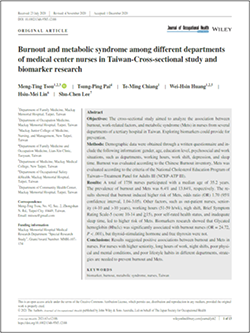#0110 Burnout and metabolic syndrome among different departments of medical center nurses in Taiwan-Cross-sectional study and biomarker research

Burnout is a Risk Factor for Metabolic Syndrome in Nurses
Burnout is a psychological state of exhaustion caused by prolonged exposure to chronic stress, and studies have shown that work-related burnout is very common in healthcare professionals such as nurses. Another condition that is relatively common in healthcare professionals is metabolic syndrome, which is a cluster of metabolic abnormalities that can increase a person’s risks of heart disease, stroke, and diabetes.
Interestingly, some studies have yielded evidence that burnout is a risk factor for metabolic syndrome in nurses. This potential relationship piqued our curiosity, so we decided to conduct an investigation into the associations between burnout, work-related factors, and metabolic syndrome in nurses active at our hospital in Taipei. We made a point of exploring how such associations vary across different nursing departments, which is something that previous studies had not considered. A detailed description of our study appears in an article recently published in the Journal of Occupational Health.
In total, 1.758 nurses participated in this study. They completed a written questionnaire that enquired about psychosocial and work-related variables, such as nursing departments, working hours, work shifts, feelings of depression, and sleep times. They underwent burnout assessments with a validated Chinese-language instrument and underwent screenings for metabolic syndrome based on Taiwanese national guidelines.
Overall, 6.4% of the nurses had burnout, and 13.84% of them had metabolic syndrome. Nurses who had burnout were 1.7 times more likely to have metabolic syndrome than their counterparts without burnout were. The other risk factors for metabolic syndrome included working in outpatient care, having worked in nursing for a long time, working long hours or night shifts, poor self-reported health, and inadequate sleep times.
In conclusion, these results provide further evidence for an association between burnout and metabolic syndrome. They also highlight the particular risks of metabolic syndrome for more senior nurses, nurses working in outpatient care, and nurses who have to work night shifts. We hope that our findings will help to guide efforts to prevent burnout and metabolic syndrome in nurses.

Link to the original journal article:
https://onlinelibrary.wiley.com/doi/10.1002/1348-9585.12188
Title of the paper:
Burnout and metabolic syndrome among different departments of medical center nurses in Taiwan-Cross-sectional study and biomarker research
Authors:
Meng-Ting Tsou, Tsung-Ping Pai, Te-Ming Chiang, Wei-Hsin Huang, Hsiu-Mei Lin, and Shu-Chen Lee




